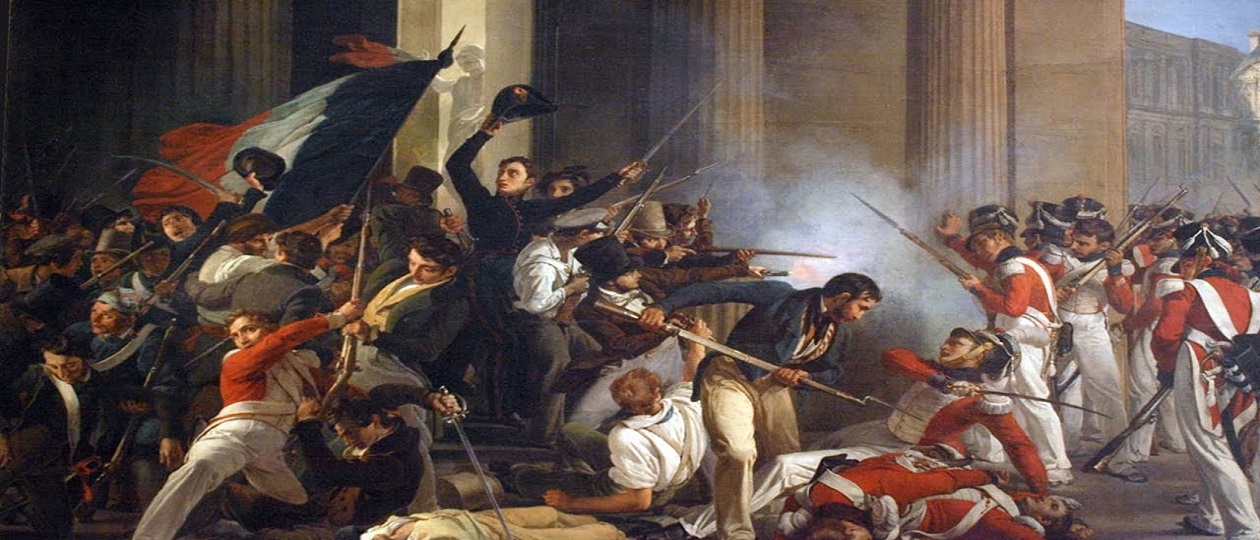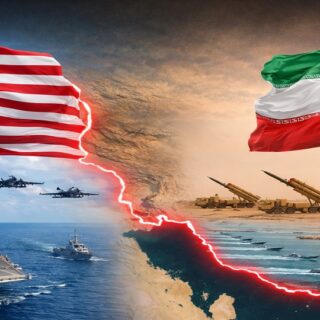
The French Revolution was the greatest revolution and civil war that took place in a series of revolutions, civil wars, and national-liberation wars that began with the revolution in Geneva Switzerland in 1768 and finished with the final defeat of Emperor Napoleon Bonaparte at the Battle of Waterloo in 1815.
The wave of revolutions and national-liberation wars in Europe between 1768-1815 included revolutions and political upheavals in France, Holland, Belgium, Germany, Italy, Ireland, Poland, and other countries. There were national-liberation wars in Spain, Germany, and Portugal. This period also coincided with the American Revolution (War of Independence), wars of independence in Latin American countries and Caribbean islands, anti-colonial uprisings and movements in Africa, Asia, and Oceania.
Historians now are often comparing the French Revolution not only with revolutions in Europe, but also with revolutions and other upheavals in the rest of the world during this period.[1]
Not all historians support this approach. French historians have often objected to historians regarding the French Revolution as just one of many revolutions in the period from 1768 to 1815 and have argued that this approach diminishes the significance of the French Revolution.
It is impossible to diminish the significance of the French Revolution when we compare it to other European revolutions during this period. The revolution happened in France — the center of European culture —and was bound to attract supporters and opponents in all European countries. The French revolution had its supporters in the Russian Empire although Soviet historians exaggerated the extent of political turmoil in Russia.[2]
Australian historian Peter McPhee noted that the French Revolution was the most radical of all the revolutions that happened in the world during this period. Feudalism was completely liquidated in France and French revolutionaries made huge steps forward in establishing universal male voting rights and the separation of church and state. Most importantly, the French successfully mobilized all their resources and dealt a crushing blow to the coalition of European monarchies that opposed the revolution.[3, p. 64]
American historian Robert Palmer and French historian Jacques Godechot argued, beginning in the 1950s, that the French Revolution formed part of a larger “Democratic Revolution” or “Atlantic Revolution” in the late 18th century in Europe and North America.[4] Palmer and Godechot emphasized that the demands of French revolutionaries for changes in the ruling of the state, a widening of the rights of nonprivileged social strata in ruling the state and abolition of the power of closed corporate institutions were a key component of revolutionary turmoil in Europe and America. By studying many revolutions, they concluded that one can speak about “An Age of the Democratic Revolution” or an “Atlantic Revolution”. Their concept of a common wave of revolutions has been called the “Palmer-Godechot thesis”.
Palmer and Godechot regarded the revolutions of the late 18th century as democratic, but not in our current understanding of democracy. The supporters of changes did not support universal voting rights. They feared rule by the mob as no less dangerous than the dictatorship of absolute monarchies and privileged corporations. Thus, the revolutions usually began as movements demanding a wider participation of members of educated society in ruling the country, especially in parliaments and other legislative institutions.[5, pp.47-48]
The Palmer-Godechot thesis of a wave of democratic revolutions in the late 18th century has received lots of criticism for different reasons. Some historians have criticized Palmer and Godechot for focusing exclusively on political changes and ignoring other factors in the revolutions. French historians naturally accused them of downplaying the significance of the French Revolution.
Western Marxist and Soviet historians criticized Palmer and Godechot of ignoring the class struggle in the context of the transition from feudalism to capitalism and the rise of socialist ideas and movements, such as the Conspiracy of the Equals led by Gracchus Babeuf in 1796. Still other historians criticized them for ignoring the role played in the revolutions by women, the peasantry and other lower classes, ethnic and racial minorities, and members of the peoples of Latin America, the Caribbean islands, Africa, and Asia.
All these criticisms of the Palmer-Godechot thesis on the wave of revolutions have elements of truth. I prefer to extend the period of revolutions to 1815 because it would include the Latin American and Caribbean wars of independence and the national-liberation wars in Germany, Spain, and Portugal. However, it is best to compare the French Revolution only with other revolutions in Europe.
The American Revolution, wars of independence in Latin American and Caribbean islands, uprisings in Africa, Asia, and Oceania were anticolonial movements and they all included political, social, ethnic, racial, religious, and other conflicts. These movements had some similarities with European revolutions, but the fact remains that they happened in completely different historical conditions. Of course, both the European revolutions and national-liberation wars and revolutions and uprisings throughout the world all had elements of civil wars. Maybe it is safer to talk about a world-wide wave of civil wars, rather than an age of democratic revolutions.
The next article will look at the most controversial aspect of the French Revolution — the Reign of Terror of 1793-1794.
Sources Used
- Encyclopedia of the age of political revolutions and new ideologies, 1760-1815. 2 vol. Westport CT: Greenwood Press, 2007; The international encyclopedia of revolution and protest: 1500 to the present. 8 vol. Malden MA: Wiley-Blackwell, 2009 The Routledge companion to the French Revolution in world history. London; New York: Routledge/Taylor & Francis Group, 2016.
- Великая францзуская революция и Россия (The great French Revolution and Russia). Москва: Прогресс, 1989; Штранге М.М. Русское общество и французская революция, 1789-1794 гг. (Russian society and the French Revolution, 1789-1794) Москва: Издательство Академии наук СССР, 1956.
- McPhee P. Rethinking the French Revolution and the “Global Crisis” of the Late-Eighteenth Century. News and Papers from the George Rudé Seminar. French History and Civilization. Vol.6. 2015. рр.56–64.
https://h-france.net/rude/wp-content/uploads/2017/08/McPheeVol6.pdf
- Godechot, Jacques Leon. La grande nation: l’expansion revolutionnaire de la France dans le monde, 1789-1799. 2e ed. Paris: Aubier Montaigne, 1983; Godechot, Jacques Leon.
Les revolutions (1770-1799). Paris: Presses universitaires de France, 1970; Palmer, R. R. The age of the democratic revolution; a political history of Europe and America. 2 vol. Princeton NJ: Princeton University Press, 1959-1964.
- Рокки, Тони. Столетие Русской революции и Гражданской войны в общеевропейском контексте истории революций, контрреволюций и идеологических конфликтов: методология сравнительного подхода. (The centennials of the Russian revolution and Civil War in the Еuropean-wide context of the history of revolutions, counter-revolutions and ideological conflicts: the methodology of the comparative approach. Историческая и социально-образовательная мысль. 2019. Том.11. №1. С.39-54.





